- Home
- Alex Scarrow
Plague World
Plague World Read online
To Debbie, beta-reader of my first drafts and editor of my life.
Thank you for giving me your love and taking my name.
CONTENTS
PART I
PROLOGUE
CHAPTER 1
CHAPTER 2
CHAPTER 3
CHAPTER 4
CHAPTER 5
CHAPTER 6
CHAPTER 7
CHAPTER 8
CHAPTER 9
CHAPTER 10
CHAPTER 11
CHAPTER 12
CHAPTER 13
CHAPTER 14
CHAPTER 15
CHAPTER 16
PART II
CHAPTER 17
CHAPTER 18
CHAPTER 19
CHAPTER 20
CHAPTER 21
CHAPTER 22
CHAPTER 23
CHAPTER 24
CHAPTER 25
CHAPTER 26
CHAPTER 27
CHAPTER 28
CHAPTER 29
CHAPTER 30
CHAPTER 31
CHAPTER 32
CHAPTER 33
CHAPTER 34
CHAPTER 35
CHAPTER 36
CHAPTER 37
CHAPTER 38
CHAPTER 39
CHAPTER 40
CHAPTER 41
CHAPTER 42
CHAPTER 43
CHAPTER 44
CHAPTER 45
CHAPTER 46
CHAPTER 47
CHAPTER 48
PART III
CHAPTER 49
CHAPTER 50
CHAPTER 51
AFTERWORD
ACKNOWLEDGEMENTS
ABOUT THE AUTHOR
PLAGUE LAND
PLAGUE NATION
PART I
PROLOGUE
Two and a Half Years Ago
Freya woke up, bleary-eyed and still dressed from last night.
She’d gone to sleep late – it was after two o’clock when she’d finally closed her laptop and turned off the TV. She’d plumped up the cushions so she could continue looking out of her bedroom window at the small cul-de-sac. Her mind had raced in the dark for several hours as she replayed the day’s headlines about the virus. The tone of panic in them had been increasing throughout the day and evening. Her Facebook feed had become littered with desperate posts from friends around the world; grainy images of bodies in the street that could just as easily have been piles of clothes and rubbish.
People really did panic way too easily on Facebook.
Freya was half certain that by this morning the story would have run out of steam and become another overnight Social Media Big Nothing, and half worried that this was it – today would be the Day the World Ended.
She stretched out her aching legs and shuffled her numb bum until she was sitting up and looking down at the houses and driveways opposite.
It looked quiet and still out there as Freya checked her watch: quarter past ten.
She looked up and down the cul-de-sac at all the cars that were usually gone by now. Sunday mornings sometimes looked like this. But today should be a normal working Wednesday.
And it was well past when she should be up. Mum should’ve knocked on her door to rouse her ages ago. End of the World or not, she was meant to go into college this morning and, if her watch was right, she’d already missed the first lecture.
‘Crap!’ she hissed. ‘Mum!’ she called out. ‘I’m late!’
No answer. She pulled herself up, wearily wincing at the ever-present aching pain in her hips, and reached for a couple of paracetamol on the bedside table, knocking them back with the cold dregs of last night’s tea. She reached down for her laptop on the end of her bed.
That’s when she saw them through the window, snaking dark lines running across the road and driveways, like zigzagging pencil scribbles. She leaned over the bed, bracing herself with one hand on the windowsill to get a better look outside. She followed one line across the road, up a driveway and up to the front step of number 9. The front door was ajar and the dark scribble seemed to carry on inside.
Or perhaps it had come out?
Next door at number 10, she could see a number of lines converging on a dark hump of clothes lying on the driveway. It looked like one of those grainy images on the internet.
‘Mum!’ she called out again, starting to panic.
No answer, but she could hear voices downstairs. The TV was on.
She staggered across the bedroom and picked up the walking stick by her door. She stepped out into the hall and glanced through the open door into her parent’s room; the bed was made.
Mum usually made it when she came back after her morning shift at the chemist. Perhaps she hadn’t gone in this morning.
Freya made her way down the narrow and steep steps, one at a time, her walking stick leading the way.
‘Mum? Why didn’t you wake me up? I’m late!’
She could hear the TV. It wasn’t news. It was a rerun of Friends. Maybe Dad was off today as well?
‘Dad? You in?’
No answer from him either. She reached the bottom of the stairs and pushed the lounge door inwards to see the TV merrily chatting away to itself. Joey and Chandler were trying to tidy up their apartment.
‘Dad?’ Freya peered around the lounge. She could see unfinished cups of coffee on the coffee table, Dad’s tablet on the sofa, Mum’s phone on the table. She never went to work without it.
Down the short hall, the kitchen door was slightly open. Maybe they were both in there.
Taking the few steps to the door, Freya felt something soft and unpleasant give beneath her left shoe. She looked down and saw a dark, sticky line. It looked like someone had poured a thin trail of balsamic vinegar on to the carpet. Mum wouldn’t leave something like that un-scrubbed, even if meant turning up late for work.
She pushed the kitchen door open, expecting to see at least one of her parents at the breakfast bar. Her moan at Mum for not waking her up was instantly forgotten as her eyes struggled to make sense of the nightmare scene spread out across the kitchen floor.
CHAPTER 1
The Present
Freya jerked awake. The nightmare was a rerun of the one she had far too often. Always the same sequence: waking up, coming down the stairs, opening the kitchen door and . . . A memory she’d done very well to box away. It was only in her dreams that the lid creaked open.
She stared up at the stained gauze mesh of the bunk directly above her, listened to the steady throb of the ship’s diesel engine and the wheezing, snorting, whispering and fidgeting of all the other refugees crammed into the bunks around her.
For a hazy moment she was confused, startled by her surroundings.
Where am I?
Then it came back to her all too quickly. None of it was a dream: all of it had been horrifically real. The last two years, surviving the plague’s outbreak, meeting Leon and Grace, escaping that camp in Southampton when everything went crazy and finally managing to be one of the lucky few to get aboard a US Navy ship.
She had a folded piece of red card in her hip pocket and she was guarding it like a Willy Wonka Golden Ticket. Her ID card. Since being bustled aboard this ship she’d only had to show it a few times and only once been asked to open it to reveal the photo inside. On that occasion she’d flashed it quickly to the harried-looking marine – a picture of a dark-haired teenage girl called Emma Russell. It was sheer luck that she’d managed to pick up an identity card belonging to someone who bore a vague resemblance to her.
If you squinted.
A lot.
The soldier had nodded, not even looking, and waved her through into the ship’s canteen to queue for the daily meal along with everyone else.
Right
now, the small fleet of ships was at sea somewhere in the English Channel, heading west into the cold grey Atlantic. Their American rescuers appeared to be relaxing the panicked safety measures ever so slightly. Now that they were safely away from land, everyone aboard had a ‘red’ on them, which meant they’d been blood-tested ashore and cleared.
Freya hoped she was the only person on board carrying someone else’s red in her pocket. She knew she wasn’t infected, but she was damned if she’d blindly trust anyone else. So it was a touch disconcerting that she’d gone three days aboard this ship and no one so far had noticed that she was not the same girl as the one in the mugshot. She’d even once idiotically introduced herself to another evacuee as ‘Freya’ not ‘Emma’. So surely it was only a matter of time before she was caught out.
Then what? I get thrown overboard?
She doubted that. More likely they’d make her do a blood test again.
But . . .
Shit. Shut up, brain.
But . . . there’ve been people infected without them even knowing, right?
Freya balled her fist and thumped her hip softly. She knew she was clean. She’d never made direct contact with a viral. Crap, they’d got close, but not touched.
Leon. Her mind replayed their narrow escape from the underpass just outside Oxford: both of them cornered in the dark, those repulsive crablike creatures closing in on them. They’d been rescued at the very last moment by Corkie and his squad of soldiers.
So where the hell are you, Leon? Freya swore under her breath and the person in the bunk above grunted down at her to shut up.
She was pretty sure he wasn’t on this ship. She’d checked the bunks and the sleeping bags laid out on the hangar deck and scanned the queue at meal times. Leon wasn’t aboard the USS Gerald R. Ford as far as she could see. But he might be on one of the other ships in the small fleet heading west. Or, if not one of those, then one of the other ‘Pacific Alliance’ ships?
Dammit. Her memory of the mass breakout on the Southampton quayside, the chaos, the panic . . . it was all so fragmented. She’d been separated from her friends by the surge of people. She had no idea if Leon and Grace had got out of the quarantine pen, and if they had which way they’d run. They could be on one of these US ships heading south-west to Cuba, or the Chinese one going south.
Or, they could—
No. Shut up, brain. They’re not dead. They’re not infected. If sixth sense was a genuine thing, if there was a possibility of ‘knowing’ someone was alive then, yeah . . . somehow, she knew Leon and Grace were both alive.
Somewhere.
Their chances had to have been better than hers. If she could manage to escape, hobbled by her MS, dragging that useless waste-of-space left leg behind her, then those two, able-bodied and quick-witted, must have managed to get away.
But whether she was going to see either of them again?
Ever?
A solitary tear rolled down the side of her cheek and tickled her ear.
Piss off, she chided herself. I’m not giving up on them yet.
There had been two other boats on the American side of the rescue camp. There’d been three Southampton rescue ships in total, which had joined up with four ships that had collected refugees from Calais. All seven ships had rendezvoused in the Channel yesterday, and there was talk that some of the British refugees had been transferred across to one of the Calais ships because it had more space.
Presumably, at some point, someone was going to take down names and assemble a list of all those who’d been rescued. Maybe en route, maybe once they’d got there.
Freya hoped it would be sooner rather than later.
They’d been told that it would be a week or so on this crowded ship before arriving in Cuba, presumably to be offloaded into another wire-mesh holding camp. Leon would be looking for her too. She could imagine them reversing Scooby-Doo style into each other and jumping into the air with the fright, then clumsily embracing, clunking their coconut heads together like a pair of uncool idiots.
CHAPTER 2
‘Repeat your last. Over.’ Tom Friedmann listened to the radio speaker whistling and spitting out white noise.
‘I will repeat . . .’ Captain Xien spoke slowly. His English was fluent, but the radio signal had been weakened by the growing distance between both small fleets.
‘. . . We have begun repeating test, of all British refugees,’ continued Xien. ‘I advise that you do this also. Over.’
Tom looked at Captain Donner, the US destroyer’s CO. He nodded. They’d discussed the matter just this morning. The departure had been utterly chaotic. Shambolic. There was not enough certainty that every civilian packed into the corridors and passages below deck was clear of infection. In the confusion of those last few minutes – as the ships had all begun to back away from the Southampton quays – it was very possible some untested refugees had slipped aboard.
‘Understood, Captain Xien. I will discuss this with my senior officers. Over.’
The speaker whistled and hissed for a moment and they caught the tail-end of Xien’s reply.
‘. . . ing procedure. I will wish you safe travel until we talk next time. Over and out.’
Tom set the radio handset back in its cradle and gazed out of the one-eighty-degree windows of the ship’s bridge at the flat and grey Atlantic beyond.
The ships that had collected refugees from Calais had managed a much more organized departure – not entirely without drama, of course. The several squads of US marines he’d assigned to them had to hold a perimeter, firing into the air to keep those they couldn’t take from surging forward. The captain of one of the other US Navy ships had said it was like the fall of Saigon all over again – people clinging to the railings, dangling from mooring lines. Totally crazy.
Both mixed fleets had rendezvoused in the Channel and redistributed their loads of refugees to balance them more easily among the ships. So they now had mostly British survivors on board this ship with a mixture of Europeans, and some from as far away as North Africa. It was clear to Tom that there must be small pockets of survivors left all over the world, but with every passing month, more and more of them would fail and perish.
‘We’re going to have to test them all again,’ said Tom. ‘The Brits and the others. All of them. Ship crews as well.’
‘I think that would be very wise, sir.’
Tom was still holding on to a thread of hope that his kids, Leon and Grace, might be lurking in a passageway aboard this ship or one of the others sailing nearby. ‘And we need to establish a proper passenger manifest.’
‘Yes, sir.’
‘And no more ship-to-ship movement of people until every last one of us has been tested.’ He turned to look at Captain James Donner. ‘Can you make a start organizing that, Jim?’
Donner nodded again. ‘I’ll liaise with the other ships’ captains immediately.’
‘Good.’
Tom turned back to look out of the broad windows at the stern of their ship, ploughing south-west through a gently breaking sea. There’d been a moment two days ago when the fleet had divided: the US ships continuing west to cross the Atlantic, the others heading south for a much longer journey to New Zealand. Tom had been almost tempted to order his fleet to go south with them, but he hadn’t.
He had orders.
Orders from Trent to make his way directly back to Cuba.
What remained of the Chinese navy’s high command might be steering the decision-making down there in New Zealand, but at least they didn’t have a swaggering idiot in charge of things. President Douglas Trent – once his best friend Dougie – was becoming a liability.
He could have announced they were joining the Pacific Nations, but wondered how long his temporarily assigned authority would have lasted. It wouldn’t have been long before naval officers with side arms relieved him of his role and steered them back on track towards Cuba – President Douglas Trent’s New United States.
While Tom was on
his rescue mission, Trent had launched two tactical nukes just a few kilometres offshore from Havana, a little reminder of the Big Goddamn Stick he was carrying around with him. Two mile-high mushroom clouds of vaporized sea water, looming over the island like twin Swords of Damocles, had been more than enough of a demonstration of Trent’s resolve for President Questra and the Partido Comunista de Cuba to submit to his strict terms.
Trent had used a couple of nukes to terrify the Cubans who were hosting the surviving Americans. He still had another few dozen to play around with.
That son of a bitch is a smoking firework, a chimp with a loaded machine gun.
If Tom found Grace and Leon aboard this ship, today, he wouldn’t rule out commandeering a motorboat and racing after the Chinese, Australian and New Zealand ships.
Better the devil you DON’T know . . . than a dangerous blowhard like Trent.
CHAPTER 3
‘I am very, very disappointed, children.’
Grace felt her legs turning to jelly beneath her. Her stomach was churning. She was convinced she was going to give herself away by fainting. Or throwing up.
‘Now this is something I don’t expect to see happening at Greenwich Elementary School. This is bullying of the worst kind.’
Everyone was in the main hall. Mrs Baumgardner, the school principal, had her ‘angry spectacles’ on – the ones with the thick black frames that made her look boggle-eyed and terrifying. ‘I want whoever did this appalling thing to raise their hand.’
Grace did what everyone else was doing, she looked around.
‘Come on. Nobody is going anywhere until I find out who did this!’
It hadn’t been bullying. Grace would have called it messing around maybe. Smearing jam around someone else’s locker was hardly bullying.
‘Come on!’ snapped Mrs Baumgardner. ‘This is your last chance to own up.’
Grace closed her eyes and slowly raised her hand.
And the awful memory faded.
She opened her eyes and Mrs Baumgardner and the school were gone.
‘Next!’
Grace’s eyes rested on the Chinese soldier in the biohazard suit. She could see his face through the perspex plate of his helmet. No reassuring smile. He simply flexed his gloved fingers, beckoning her to step forward. Standing beside him was a young Australian midshipman in his navy uniform. She could see his gaze momentarily darting over the burn scars on the side of her face, then he offered her a nod.

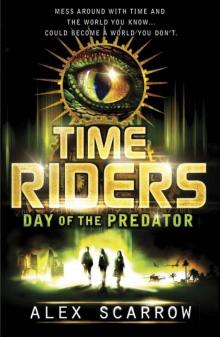 Day of the Predator
Day of the Predator Ellie Quin Book 3: Beneath the Neon Sky
Ellie Quin Book 3: Beneath the Neon Sky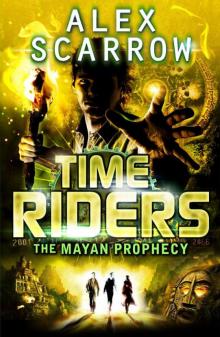 The Mayan Prophecy
The Mayan Prophecy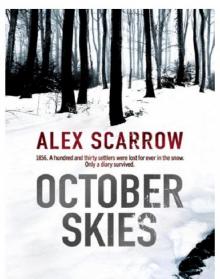 October Skies
October Skies Ellie Quin Episode 4: Ellie Quin in WonderLand (The Ellie Quin Series)
Ellie Quin Episode 4: Ellie Quin in WonderLand (The Ellie Quin Series)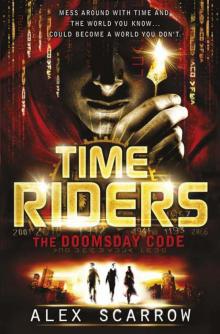 Time Riders
Time Riders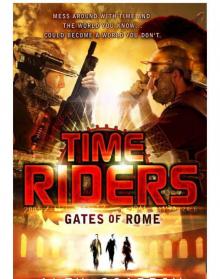 Gates of Rome
Gates of Rome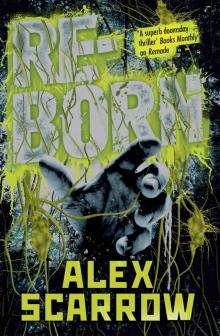 Reborn
Reborn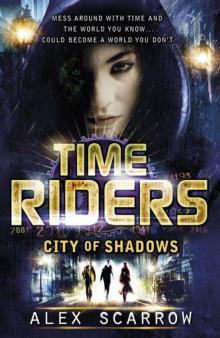 City of Shadows
City of Shadows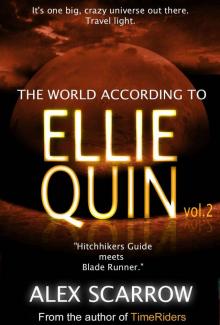 Ellie Quin Book 2: The World According to Ellie Quin (The Ellie Quin Series)
Ellie Quin Book 2: The World According to Ellie Quin (The Ellie Quin Series) Ellie Quin Episode 5: A Girl Reborn
Ellie Quin Episode 5: A Girl Reborn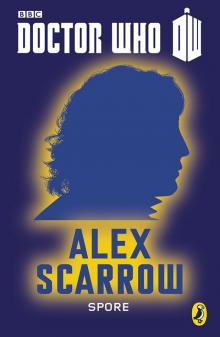 Spore
Spore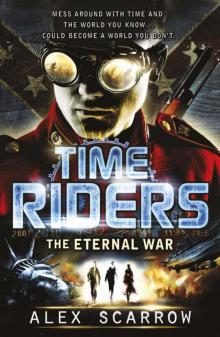 The Eternal War
The Eternal War Last Light
Last Light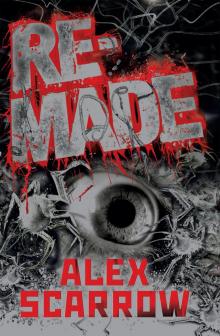 Remade
Remade Ellie Quin Book 2: The World According to Ellie Quin
Ellie Quin Book 2: The World According to Ellie Quin Ellie Quin Book 3: Beneath the Neon Sky (The Ellie Quin Series)
Ellie Quin Book 3: Beneath the Neon Sky (The Ellie Quin Series)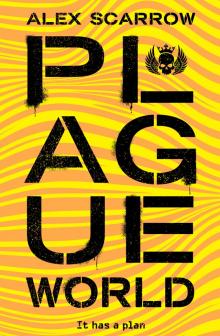 Plague World
Plague World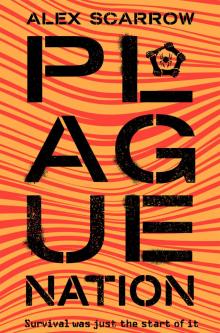 Plague Nation
Plague Nation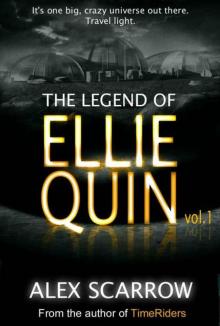 Ellie Quin Book 01: The Legend of Ellie Quin
Ellie Quin Book 01: The Legend of Ellie Quin Ellie Quin - 04 - Ellie Quin in WonderLand
Ellie Quin - 04 - Ellie Quin in WonderLand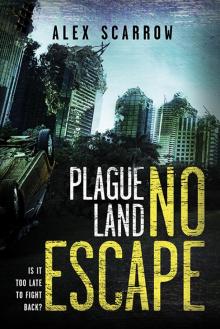 No Escape
No Escape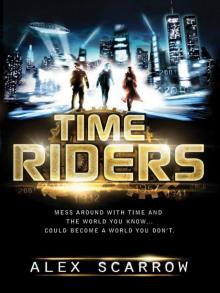 TimeRiders
TimeRiders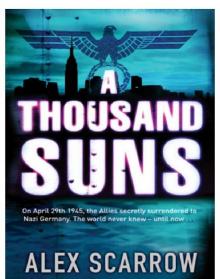 A Thousand Suns
A Thousand Suns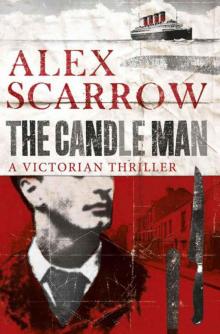 The Candle Man
The Candle Man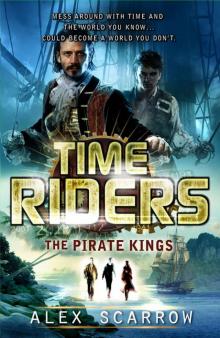 The Pirate Kings
The Pirate Kings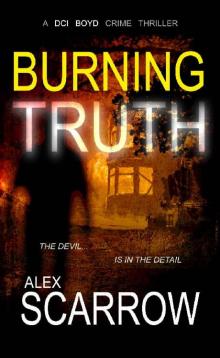 Burning Truth: An Edge-0f-The-Seat British Crime Thriller (DCI BOYD CRIME THRILLERS Book3) (DCI BOYD CRIME SERIES)
Burning Truth: An Edge-0f-The-Seat British Crime Thriller (DCI BOYD CRIME THRILLERS Book3) (DCI BOYD CRIME SERIES)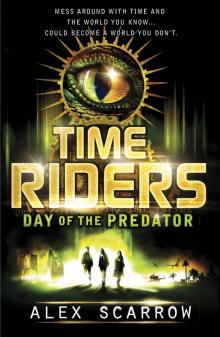 Day of the Predator tr-2
Day of the Predator tr-2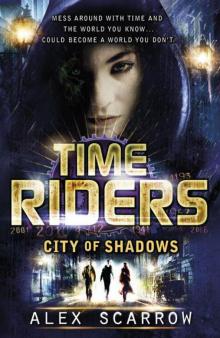 City of Shadows tr-6
City of Shadows tr-6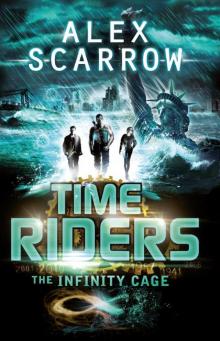 TimeRiders: The Infinity Cage (book 9)
TimeRiders: The Infinity Cage (book 9)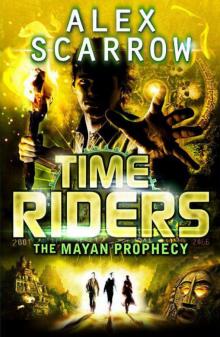 The mayan prophecy (Timeriders # 8)
The mayan prophecy (Timeriders # 8)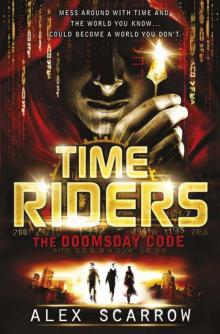 TimeRiders: The Doomsday Code (Book 3)
TimeRiders: The Doomsday Code (Book 3)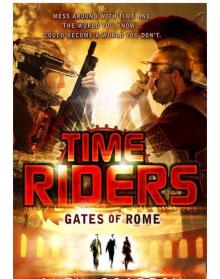 Gates of Rome tr-5
Gates of Rome tr-5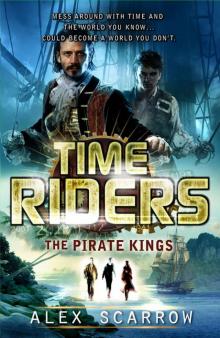 TimeRiders: The Pirate Kings (Book 7)
TimeRiders: The Pirate Kings (Book 7)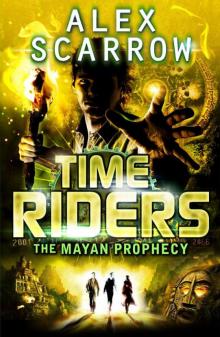 TimeRiders: The Mayan Prophecy (Book 8)
TimeRiders: The Mayan Prophecy (Book 8)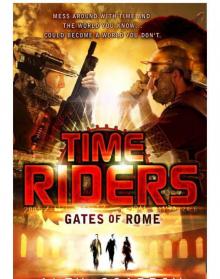 TimeRiders 05 - Gates of Rome
TimeRiders 05 - Gates of Rome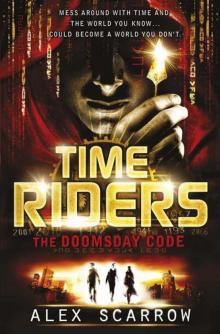 The Doomsday Code tr-3
The Doomsday Code tr-3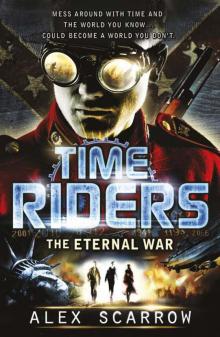 The Eternal War tr-4
The Eternal War tr-4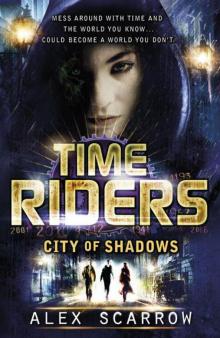 TimeRiders: City of Shadows (Book 6)
TimeRiders: City of Shadows (Book 6)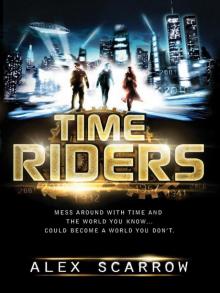 Time Riders tr-1
Time Riders tr-1 Afterlight
Afterlight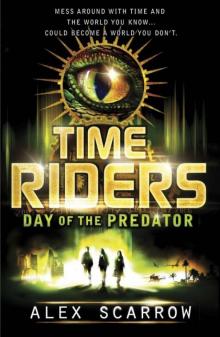 TimeRiders, Day of the Predator
TimeRiders, Day of the Predator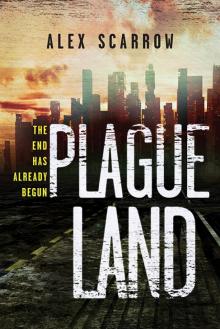 Plague Land Series, Book 1
Plague Land Series, Book 1